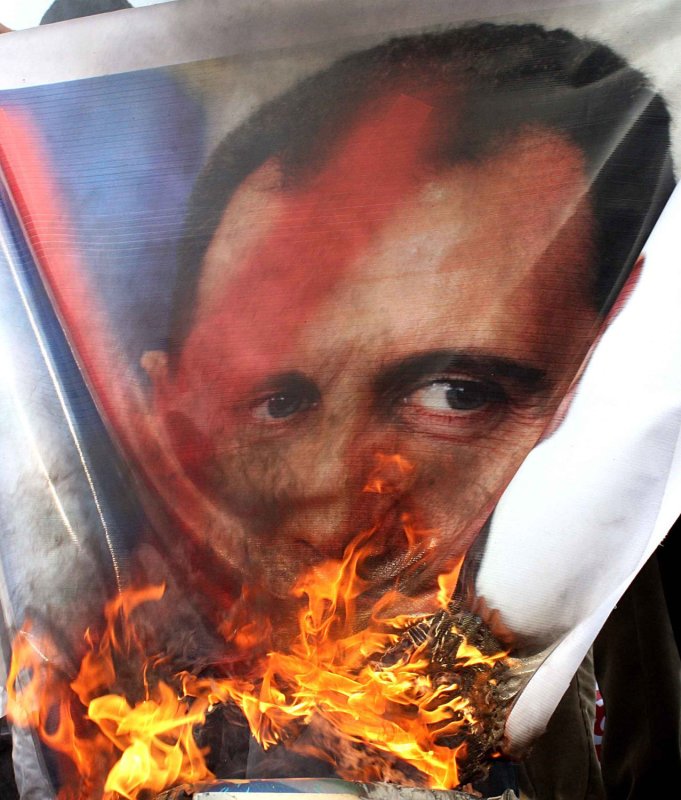1 of 4 | Syrian protestors burn pictures of Syrian President Bashar al-Assad in front of of the Arab League headquarters during the Arab League emergency session on Syria at the Arab League headquarters in Cairo, Egypt, November12, 2011. The Arab League has voted to suspend Syria from all meetings until it implements plan to end bloodshed in the civil protests. UPI/ Ahmed Ahmed |
License Photo
AMMAN, Jordan, Nov. 30 (UPI) -- The belief is growing that Syria's beleaguered President Bashar al-Assad has run out of time in his fight for survival against a stubborn 8-month-old uprising.
Reports that Assad is recruiting mercenaries from Iran, Iraq and Hezbollah in Lebanon to support his increasingly isolated regime have fueled fears the country's approaching civil war between the Sunni majority and the ruling Alawite minority and its allies.
There is even talk of a military coup, with senior officers in the Alawite-dominated military turning against the regime.
"The Arabs are now preparing for regime change," observed Paul Salem, director of the Carnegie Middle East Center in Beirut. "A coup is one scenario but the spreading of the unrest is another."
Assad's regime has been steadily quarantined by Western states. The United States and the European Union have imposed economic sanctions, including an oil embargo, and that's starting to bite. The economy is the regime's Achilles' heel.
Last Sunday, the 22-member Arab League, which for decades has been little more than a toothless talking shop for Arab leaders whose only interest was maintaining themselves in power, woke from its slumbers and overwhelmingly imposed economic sanctions on the Syrian government.
"To date, there has been little protest from Syria's merchant and business classes in Damascus and Aleppo, with most of the unrest occurring in the industrial and manufacturing cities of Homs and Latakia," the Middle East Economic Digest observed.
"But if the sanctions start to impact the economy, the middle classes may turn against their leader."
The unprecedented move by the league underlined how Arab anger is hardening against Assad amid the ongoing political upheavals across the Middle East that have so far toppled four dictators.
Neighboring Turkey, Assad's ally until the bloodletting began, has been steadily tightening the screws. Turkish Prime Minister Recep Tayyip Erdogan has shown little appetite for armed intervention but his patience is clearly wearing thin.
On Nov. 11, Erdogan threatened to cut off power supplies to Syria unless Assad ended the bloodshed. That is likely to have a limited impact but it underlined with the growing anger with Syria in Ankara, particularly after Turkish diplomatic missions in Syria were attacked by pro-regime mobs.
Ten days later, Erdogan called for the first time for Assad to step down.
Even Russia and China, which have vetoed U.N. moves to act against Damascus, are tempering their support and dropping hints Assad should go.
In recent weeks, an armed resistance, largely built around a nascent Free Syrian Army made up of thousands of defecting soldiers and with headquarters in Turkey, has emerged to take on the power of the minority-Alawite Muslim regime in Damascus.
But civilians are also reported to be taking up arms to fight the regime's brutal crackdown on what until recently were largely unarmed protesters, mainly Sunnis, in which by U.N. count more than 3,500 people have been killed.
The weapons are mainly smuggled in from neighboring Lebanon allegedly by the Muslim Brotherhood, an old enemy of the 41-year-old Assad dynasty and the most organized of the opposition groups, and smuggling networks linked to insurrectionary factions.
The regime appears to remain cohesive, with key military units controlled by Alawite officers and the vast security apparatus, the hated Mukhabarat, still loyal to Assad.
Iran, desperate to avoid losing its key Arab ally and its gateway into the Levant and the Mediterranean, has done pretty much everything except provide direct military force to rescue the Damascus regime.
But the Arab League's unexpected tough action is seen as a pointer toward more robust efforts by outside powers, such as some form of military intervention.
This is unlikely to involve Lebanon, where Hezbollah dominates the government and possesses the strongest military force in the country, and Shiite-dominated Iraq does what Tehran tells it.
But Turkey, Syria's northern neighbor, and Jordan, which over the years has crossed swords with the Assad dynasty, could well become the springboards for military intervention -- although that seems a long shot at this time.
Free Syrian Army attacks on regime targets in Damascus in recent days, although largely symbolic, indicate the still-fragmented opposition is ready to fight.
"Control of the military and international disunity will keep Assad in control in the short term," MEED concluded. "But the long-term prospects for the Syrian president look bleak."





